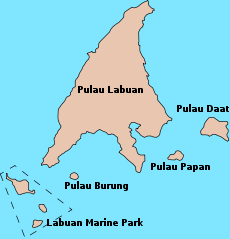
Labuan was a part of the Brunei Sultanate.
In the 1840s the previously-uninhabited island was proposed as a base for British operations against piracy in the South China Sea. The Sultan of Brunei ceded Labuan to Britain in 1846, and the island became a Crown Colony in 1848. The first White Rajah of Sarawak, James Brooke was appointed first commander-in-chief and Governor of the territory. In 1849 the Eastern Archipelago Company became the first of many companies trying to exploit its coal deposits and establish it as a coaling station for the China trade. It later became a station for the submarine cable between Singapore and Hong Kong.
It was made a part of North Borneo on 1 January 1890, then on 30 October 1906 joined to the Straits Settlements.
During World War II, Labuan was occupied by Japan from December 1941 to June 1945 and governed as part of the Northern Borneo military unit by the Japanese 37th Army. Labuan was renamed Maida Island (Pulau Maida, 前田島 [Maeda-shima]) after Marquis Toshinari Maeda, the first commander of Japanese forces in northern Borneo. The island was retaken by Australian forces in Operation Oboe Six, in June 1945. Labuan assumed its former name and was under British military administration (along with the rest of the Straits Settlements), then joined to British North Borneo, on 15 July 1946, which in turn became a part of Malaysia as the state of Sabah in 1963.
In 1984, Labuan was ceded by Sabah to the federal government and made a federal territory. In 1990, it was declared an international offshore financial centre and free trade zone. The Labuan International Business and Financial Centre (Labuan IBFC) was created as Malaysia’s only offshore financial hub on October 1990 and was operating under the name of Labuan International Offshore Financial Centre (IOFC). At the time it was established to strengthen the contribution of financial services to the Gross National Products (GNP) of Malaysia as well as to develop the island and its surrounding vicinity. The jurisdiction, supervised by the Labuan Offshore Financial Services Authority or LOFSA, offers benefits such as 3% tax on net audited results or a flat rate of Malaysian Ringgit (MYR) 20,000 to trading companies; low operational costs; liberal exchange controls; and a host of other advantages including readily available, experienced and professional service providers.
Since its inception, the jurisdiction has expanded to become a base for more than 6,500 offshore companies and more than 300 licensed financial institutions including world leading banks. Labuan IBFC is embarking on an aggressive growth strategy to become the premier international business and financial centre in the Asia Pacific region.
Labuan's business focus is on five core areas: offshore holding companies, captive insurance, Shariah-compliant Islamic Finance structures, public and private funds and wealth management. Labuan IBFC’s position is further enhanced by the launch of the Malaysian International Islamic Finance Centre initiative in August 2006.

No comments:
Post a Comment